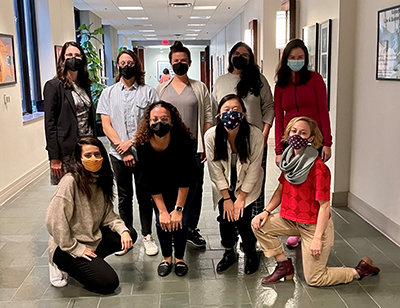This past year, the Youth Opportunity Clinic has participated in researching, drafting and advocating for legislation to eliminate youth fees and fines. This legislative advocacy effort grew from students’ clinic work helping young adult clients navigate the collateral consequences related to fees and fines that stem from delinquency or criminal cases, such as the ability to get a driver’s license. This advocacy around fees and fines happened in collaboration with the Policy Advocacy Clinic at Berkeley Law, which is part of the national Debt Free Justice initiative. This collaboration between the two clinics provided wonderful learning opportunities and challenges for our students to collaborate around. Maiya Zwerling and Rachel Wallace, the clinical teaching fellows at the Berkeley PAC, said of the collaboration, “The Berkeley Law Policy Advocacy Clinic’s partnership with Vanderbilt Law’s Youth Opportunity Clinic is an innovative collaboration to ground issue expertise on youth fees and fines in local context. YOC students have stepped in to advance the project wherever needed, whether on data collection, statutory research, or budget analysis. We look forward to continuing this partnership with YOC and hope that it can be a model for other clinical collaborations.”
 Clinic students played an invaluable role in the strategy and execution of a large data collection project around fines and fees. “One of the most surreal parts of this project was seeing our research transformed into a tool of legislative advocacy,” reflected YOC student Moriah Windus (’23). “Some of our core research assignment revolved around compiling information into huge spreadsheets, which could be time consuming and very detail intensive. Yet, at the end of the project it was deeply rewarding to see that that research turned into fact sheets and informational brochures that would assist with advocacy moving forward. The data collection process opened students’ eyes to the complexity of the decentralized Tennessee court system, as well as to significant gaps in the availability of important data.” YOC student Kate Uyeda (’22) observed, “The real-world experience from this project is unlike any project I’ve done in law school. It is one thing to read about the Freedom of Information Act in a textbook. It is another to draft the public record act requests, engage with local officials and clerks who provide the data, and to then organize and analyze the data for relevant information. There were so many things along the way that you could never learn in a classroom, and that you could only learn by doing.”
Clinic students played an invaluable role in the strategy and execution of a large data collection project around fines and fees. “One of the most surreal parts of this project was seeing our research transformed into a tool of legislative advocacy,” reflected YOC student Moriah Windus (’23). “Some of our core research assignment revolved around compiling information into huge spreadsheets, which could be time consuming and very detail intensive. Yet, at the end of the project it was deeply rewarding to see that that research turned into fact sheets and informational brochures that would assist with advocacy moving forward. The data collection process opened students’ eyes to the complexity of the decentralized Tennessee court system, as well as to significant gaps in the availability of important data.” YOC student Kate Uyeda (’22) observed, “The real-world experience from this project is unlike any project I’ve done in law school. It is one thing to read about the Freedom of Information Act in a textbook. It is another to draft the public record act requests, engage with local officials and clerks who provide the data, and to then organize and analyze the data for relevant information. There were so many things along the way that you could never learn in a classroom, and that you could only learn by doing.”
The Youth Opportunity Clinic was a core member of a coalition of organizations, including the ACLU, NAACP, Free Hearts, Stand with Children, and the Berkeley Clinic, that worked along with supporters across the political spectrum to advance this bill. Uyeda reflected on this experience of working with the coalition, “Many of us will only be in Nashville for these three years that we are in law school, and then we will leave. This project gave us the opportunity to meet and engage with local activists, advocates and leaders who are fighting every day to make things better for Tennesseans, and who will continue to do so long after we leave. I learned so much about the Nashville community through seeing it through their eyes.”
The Youth Opportunity Clinic is excited that this legislative advocacy was supported by bipartisan sponsors, Democratic Senator Raumesh Akbari in the Tennessee Senate and Republican Representative David Hawk in the Tennessee House of Representatives. Clinic students had the opportunity to prepare testimony for committees in the state Senate and House, and Professor Cara Suvall testified and answered questions about the bill. While the legislation did move forward with bipartisan support in the House, ultimately it was withdrawn this session in order to ensure that stakeholder concerns are addressed and so that this legislation will ultimately be as effective and broadly supported as possible. The clinic looks forward to working with its partners to advance this important legislation again next year.